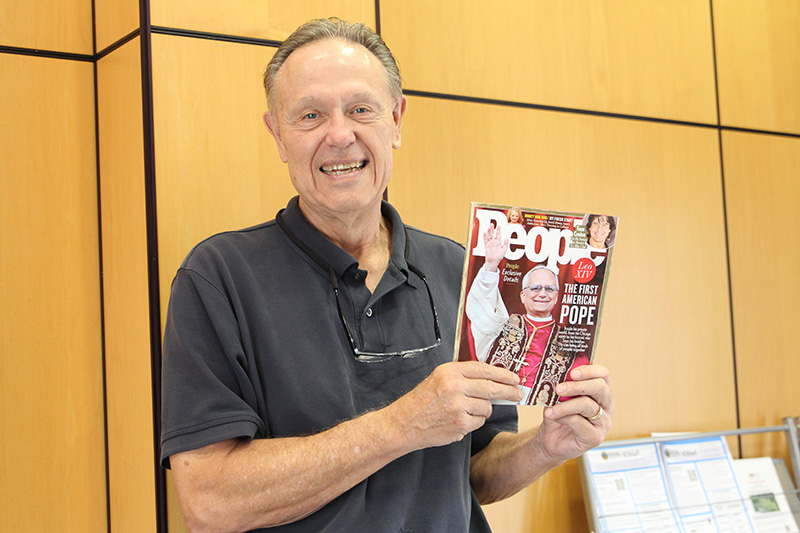The two Prevosts
 Wingate professor and St. Luke parishioner Professor Robert Prevost holds a magazine devoted to that other Robert Prevost. The professor has been confused with the pope so often by the press that a Wikipedia page has been created to explain the confusion. (Lisa M. Geraci | Catholic News Herald)
Wingate professor and St. Luke parishioner Professor Robert Prevost holds a magazine devoted to that other Robert Prevost. The professor has been confused with the pope so often by the press that a Wikipedia page has been created to explain the confusion. (Lisa M. Geraci | Catholic News Herald)
Shared Prevost traits
The confusion isn’t just over the name – Professor Robert Prevost and the pope share other key traits. Both:
- are Catholic
- are American
- were born in 1955
- are writers interested in theology and mathematics
- have two siblings
- are of French descent
WINGATE — As white smoke billowed from the roof of the Sistine Chapel and the new pope was introduced to the world on May 8, things got “real wild,” says Robert Prevost.
Not Robert Prevost, the new pope. Robert Prevost, the professor.
Prevost, an associate professor of philosophy at Wingate University and a St. Luke parishioner, has been swept up into a whirlwind of media attention over the past few weeks because of the name he shares with the new pontiff.
It was not a situation he expected to find himself in, Professor Prevost says, although in the days leading up to the pope’s election, he was already being teased by his friends as “His Holiness” and getting requests for blessings.
“It was funny, but I completely discounted it because I truly believed there would never be an American pope,” he says.
Then Robert Prevost, Chicago native and Catholic cardinal, was elected pope. Now both Prevosts are caught up in worldwide media attention – though for the professor, it’s accidental.
The confusion isn’t just over the name. The two men share other key traits (see box at right).
Plus, during their college years, they lived within 30 miles of each another, while the future pope attended Catholic Theological Union in Chicago, and the future professor went to Trinity Evangelical Divinity School in Deerfield, Illinois.
Congratulations pour in
The craziness began as soon as “Habemus Papam” was announced, Professor Prevost says. He started getting congratulatory emails from all over the world.
“The very first one I got was a fellow who emailed me on my LinkedIn account. He identified himself as a Turkish Muslim,” he chuckles. “He congratulated me on becoming the new pope and hoped that I would work towards world peace.”
Traffic to Professor Prevost’s website spiked, and emails flooded in from Turkey, Brazil, Germany – pretty much everywhere. Many of those who wrote asked about his 1992 doctoral dissertation from Oxford. The fact the paper dealt with the existence of God added to the confusion over the author’s identity.
Jordan McGillis, an editor for “City Journal,” posted May 8 on X: “Robert Francis Prevost’s ‘Probability and Theistic Explanation’ offers one of the most compelling cases for the rationality of belief in God without demanding certainty. Written over three decades ago, long before he became Pope Leo XIV …”
It was a nice review, despite the wrong attribution.
In online discussions, on talk radio and in the media, confusion between the two Prevosts ran rampant. Even now, an online search of the phrase “Robert Prevost went to Oxford” renders this AI response: “Yes, Robert Francis Prevost earned a Doctor of Philosophy (PhD) from the University of Oxford. He later became Pope Leo XIV.”
The pope never attended Oxford. He attended the Pontifical University of St. Thomas Aquinas in Rome. Professor Prevost is the real Oxford grad.
The Brazilian online publication “G1” has been among those apologizing for the mix-up, writing a correction: “G1 made a mistake when reporting that mathematician Robert Francis Prevost, who would later become Leo XIV, published a book on the probability of the existence of God. The text was written by a homonym. The author is an American also named Robert Prevost, who, like the current pontiff, graduated in mathematics.”
Global attention
Professor Prevost is handling all the attention with good humor, and he’s excited that people are now reading and discussing his dissertation from the ’90s.
“It feels good to have people paying attention to my writing, even if it is just because of the confusion,” he says.
The entertaining ambiguity with the two Prevosts has since gone global. There was a BBC interview. The Argentinian news outlet “The Reporter” wrote an article addressing the situation headlined “Confusion in the Vatican: The ‘other’ Pope appeared, and he’s not an imposter ...”
The article attributed the confusion to algorithms: “The curious thing is that the cross-identity didn’t arise from a single error. Several online searches revealed the philosopher as ‘the new pope,’ because his name appeared before that of the newly elected cardinal in various databases and web archives.”
Even as the professor was being interviewed by the BBC, he noticed a new Wikipedia page about himself devoted to the brouhaha, with a subheading titled, “Confusion with Pope Leo XIV.”
Professor Prevost says he enjoys all the fun, noting that he has yet to receive an invitation to the Vatican but already knows what he would like to talk about with the pope.
“I would ask him about his genealogy to see if there is a chance that maybe we have a similar background. Then, I would talk to him a little bit about baseball because he’s such a Chicago White Sox fan, and I’m a Texas Rangers fan.
“Finally, I would congratulate him and tell him that our prayers are with him as he guides the Church.”
— Lisa M. Geraci



